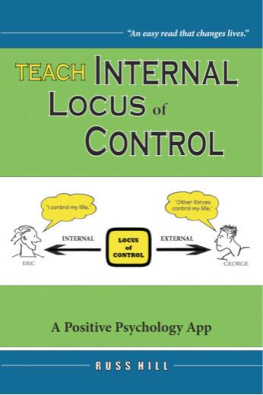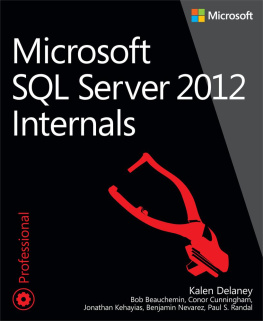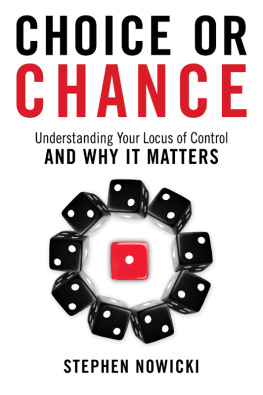Teach Internal
Locus of Control
A Positive Psychology App
R u s s H i l l
Copyright Info
Teach Internal Locus of Control: A Positive Psychology App
Copyright 2011 by Russ Hill
ISBN 978-0-9833464-0-1
WILL TO POWER PRESS, Beach Haven, NJ
All rights reserved. No part of this book may be reproduced (except for inclusion in reviews), disseminated, or utilized in any form or by any means, electronic or mechanical, including photocopying, recording, or in any information storage and retrieval system, or on the Internet (World Wide Web) without written permission from the author or publisher.
For more information please contact:
www.teachinternalcontrol.com
Psychology/Achievement/Self-help/Academics/Internal Control
Editing and book design by Harvard Girl Word Services
www.harvardgirledits.com
Original cover artwork by Joanne Levine;
recreated for use here by Harvard Girl Word Services
Acknowledgments
For George
Note from author: You will see that I have chosen to use the masculine pronoun he in many cases throughout this book, with some feminine pronouns from time to time. My decision is not gender-biased, but simply an effort to make the material as easy to read and understand as possible.
I wish to gratefully acknowledge the help and support of the following individuals and institutions: Lyndon Baines Johnson, the Education President, and the National Institute of Education; Research For Better Schools, Inc., along with Anita Simon and Gil Boyer, my immediate supervisors, and the many staff members who worked with me; my editor Heidi Connolly; my research assistant Rita Halpert; and Craig Henry who inspired me to finally write this book by musing on the question, What makes the difference?
Introduction
I have two grandsons. One is a self-directed jet and the other is a ship without a captain. What makes the difference?
Both these young men are about the same age, one 23 and the other 25. Both have had excellent social and educational opportunities. Both are physically well, and both are very intelligent. Yet there is a stark contrast in their level of achievement and happiness to date. Why?
Eric (not his real name), the older of the two and the self-directed jet, completed his undergraduate college work with a B++ average, majoring in a challenging philosophy program and picking up the equivalent of majors in both journalism and business at the same time. In the extracurricular world, he has become qualified as a wilderness instructor and a rock-climbing instructor, working in a ski shop and experiencing the joy and exhilaration that comes with achieving a high level of skiing performance. Eric had a great time in college, and continued to take courses in the summer after his formal graduation in order to complete the business curriculum. In fact, he was so enthusiastic that eventually the university had to tell him enough was enough to get him to stop taking classes. Now, after working three years at a prestigious international personnel firm, Eric is making an amazing amount of money, flying around the Pacific Rim, working on interesting projects, and is on track to become a partner in his company. Fantastic!
George, on the other hand, the younger, undirected ship, started out in college majoring in mathematics. Although he qualified for advanced placement he dropped out in his second semester. He was living at home and faked going to class. He said the college counselor had given him poor guidance. His next attempt was at an excellent local community college where the same thing happened. This time he said his courses were boring. For a time George worked at a restaurant at night for tips and a low hourly wage. He usually went out with friends and acquaintances after work and slept late in the morning, regularly indulging in marijuana use. This became his pattern of choice. At some point he started a tech program at the community college, but again cut his classes and dropped out. School wasnt interesting, it seemed, was too much drudgery. Recently, George was out with his server acquaintances late after work and driving drunk. When he smashed his car into a tree he and the others were badly hurt. Currently, he is hanging out at his fathers home, convalescing, working as a server part time while waiting for his case to be heard before a judge. Where is George going? Nowhereexcept possibly to jail. Upsetting! Disappointing!
What is the difference between these two young men? I maintain that Eric, the self-directed jet, believes that the direction, or location of control, of his life lies within his influence. He is an achiever, an agent, an origin, who sets goals and works effectively to attain them. He is focused, and believes that he is responsible for the course his life will take.
George, however, believes that the location of control of his life lies outside his influence. He is a re-actor who allows himself to be pushed around by his immediate moods and feelings and by the expectations and demands of others. George is unfocused, and believes he is not the one responsible for the course of his life; that others and other forces are.
The differences between Eric and George become obvious when you talk to them. Eric is vital and enthusiastic. He recently told his mother that he would be tied up for the following two weeks because he was expecting to have to put in 80 hours per week to be able to complete several important projects. This was not onerous to him. In fact, it was challenging and exciting. George, on the other hand, is lethargic and uncommunicative. His life is more about waitinghanging out. He tends to act on passing impulses, and has no plans and no goals. His days activities are dictated by waves of emotional shifts, and by trying to please and impress his current friends in trivial and insignificant ways. In essence, Eric believes he can internally influence the course of his life, where George believes that his life is largely influenced by external forces.
...
This book is dedicated to George. You see, I love both of my grandsons. There is no need to worry about Eric. He is happy and challenged, and I need only stand back and observe with wonder and pleasure his approach to life. But I am deeply concerned about George who is not happy and who is in a downward spiral. He is the biblical prodigal son. I often think about him and worry about him, though I have no influence with him. Perhaps if George were to read this book he might understand that there are other possibilities. Perhaps he might consider asserting more internal control over his life. Perhaps he would begin to see that his efforts can result in achievement and happiness. Were I to see such a transformation begin to happen, I would be there to welcome him with a coat, metaphorically speaking, of many colors.
In this book we call individuals like Eric, who believe they can influence the course of their own lives, Internals. We call individuals like George, who believe they have little or no influence over the course of their lives, Externals.

Lets step back for a moment. If you are a parent, think of your children; if you are a teacher, think of your pupils; if you are a supervisor, think of your workers. Can you place the individuals in your group somewhere on this Internal-External continuum? Internals have a sense of direction and feel responsible for getting things done. They are self-starters. They schedule and anticipate tasks, and they feel responsible for the success or failure of their own efforts. Externals tend to be lackadaisical, seek to avoid responsibility, wait to be told what to do, and do not believe that their own success or failure is their responsibility.
Next page













